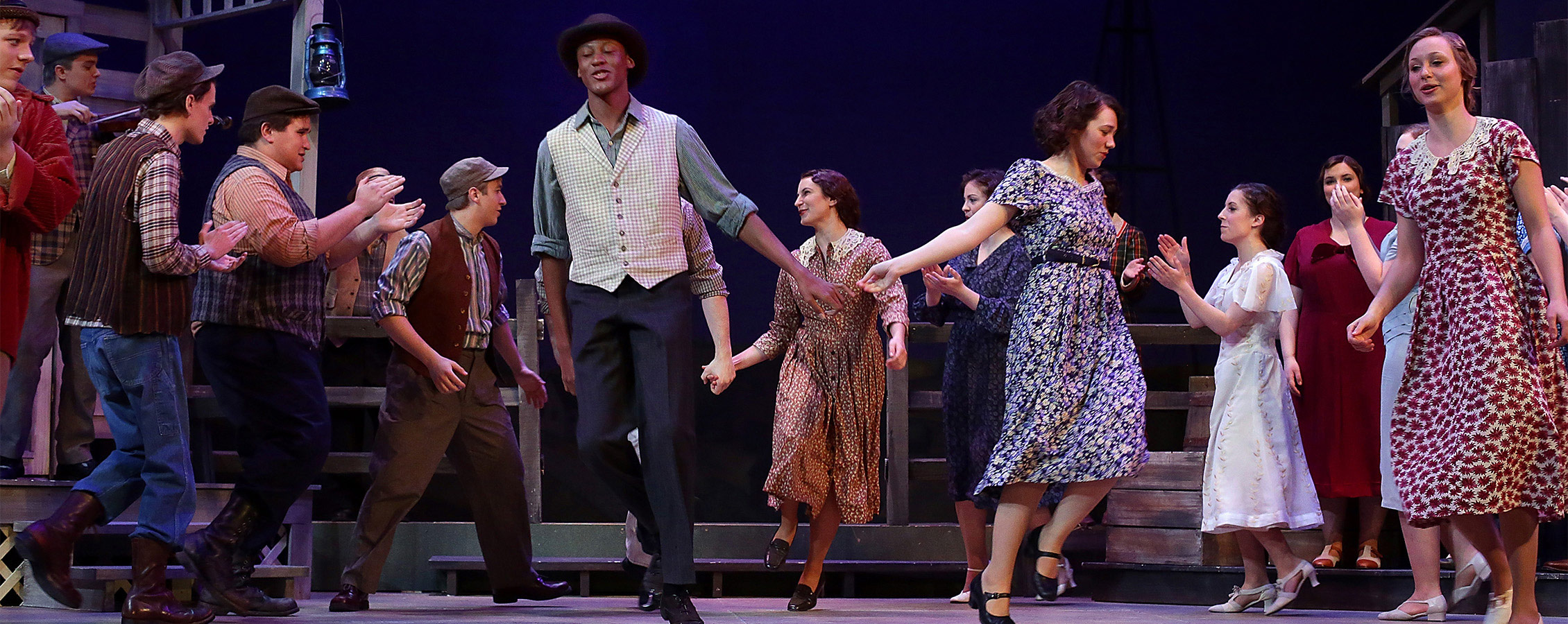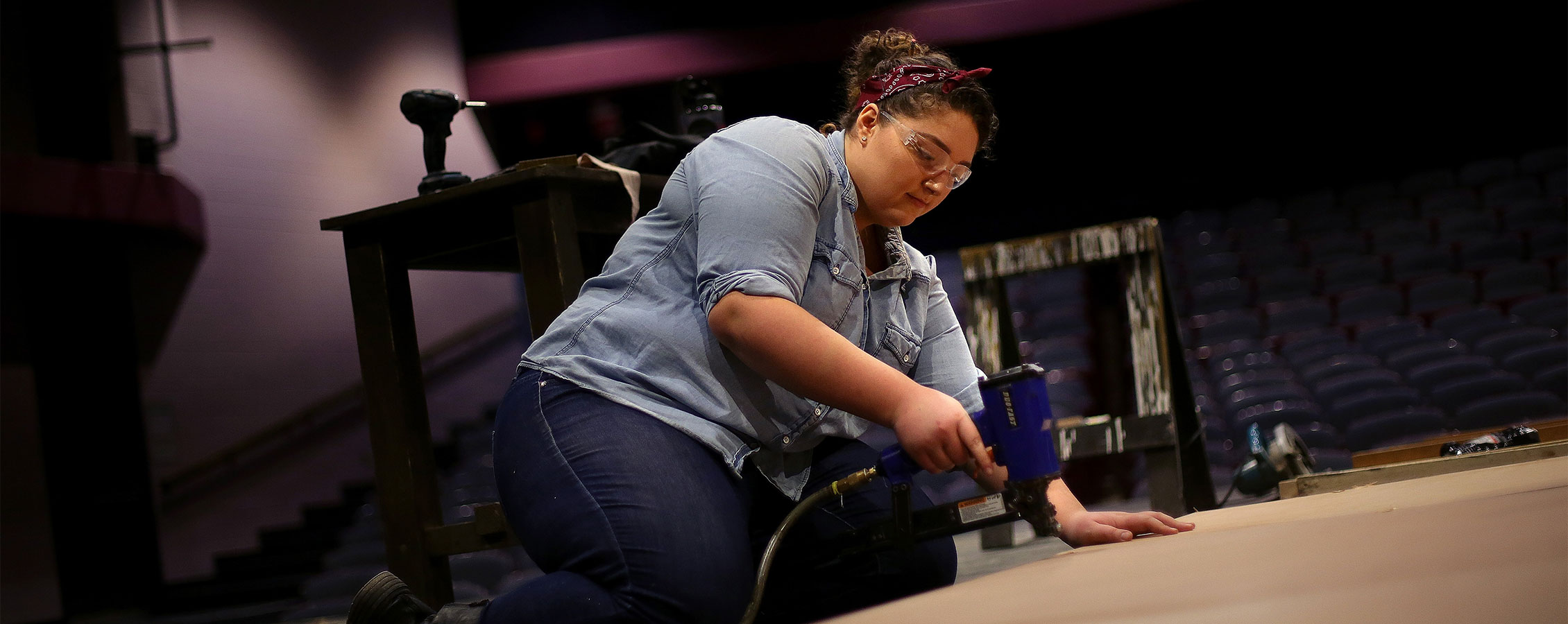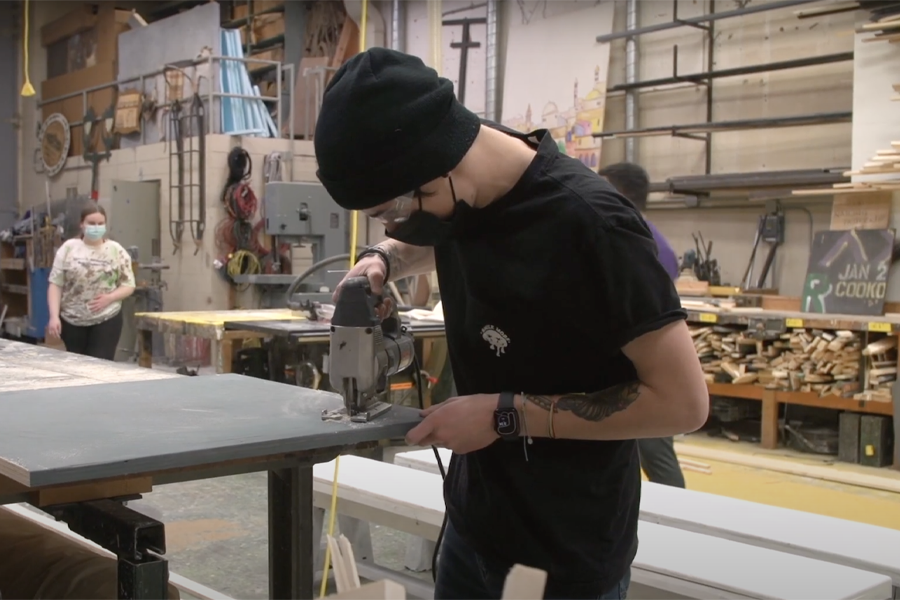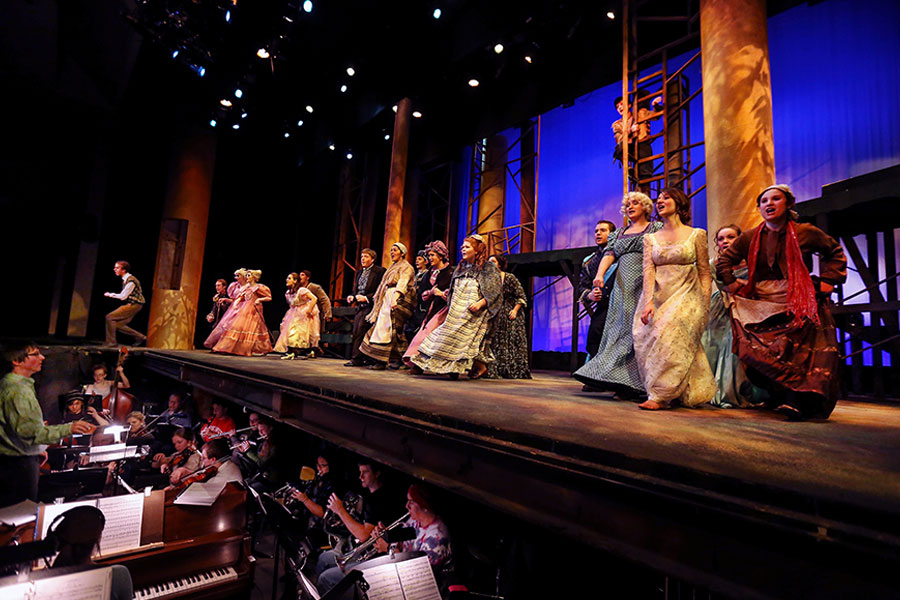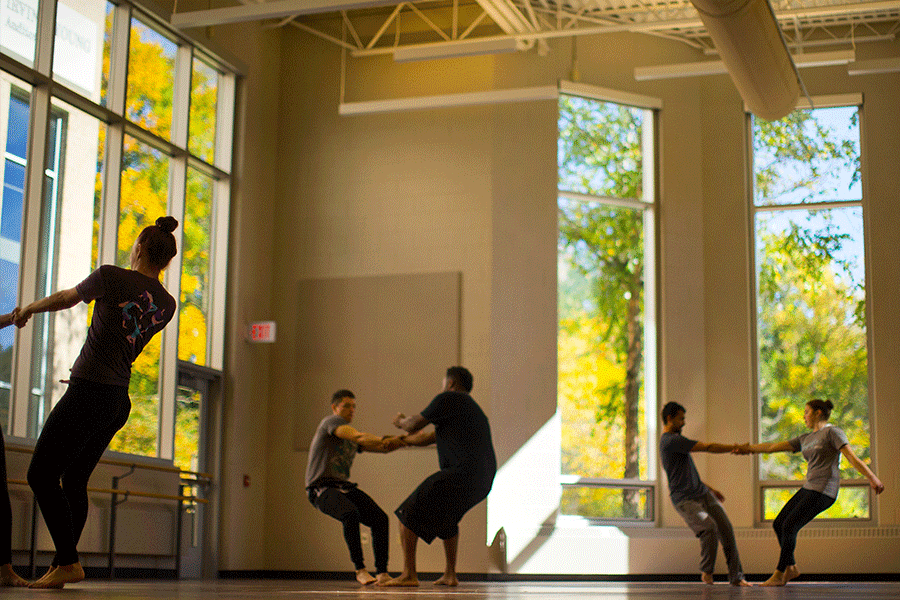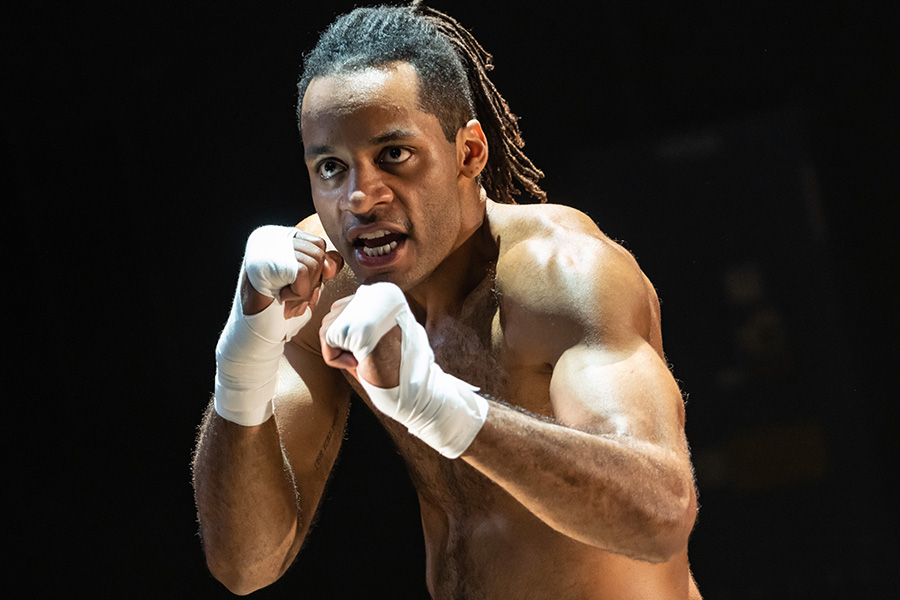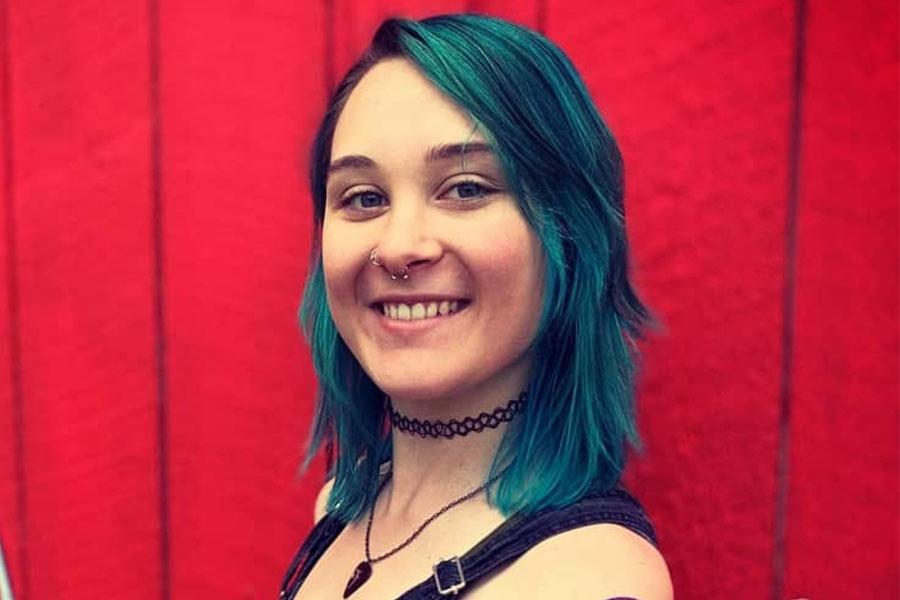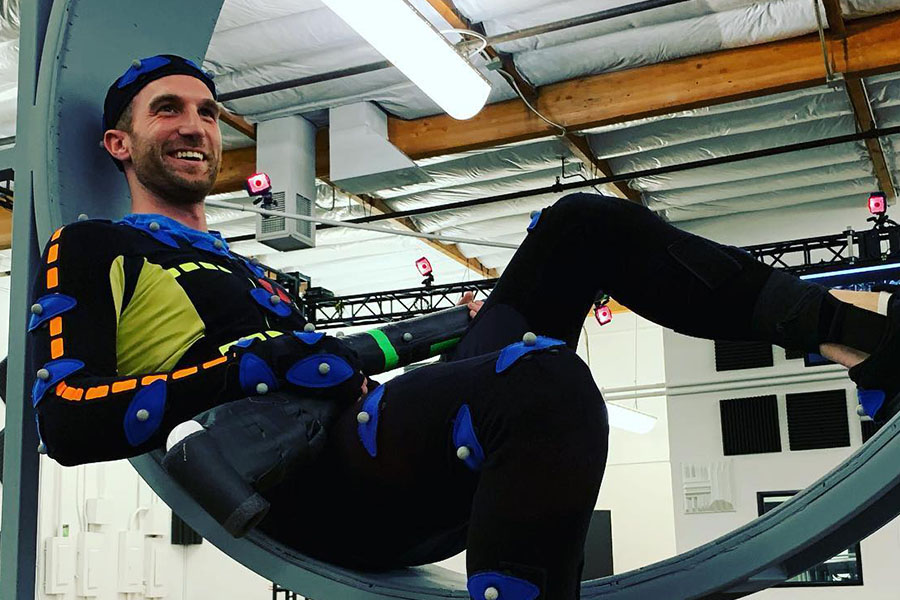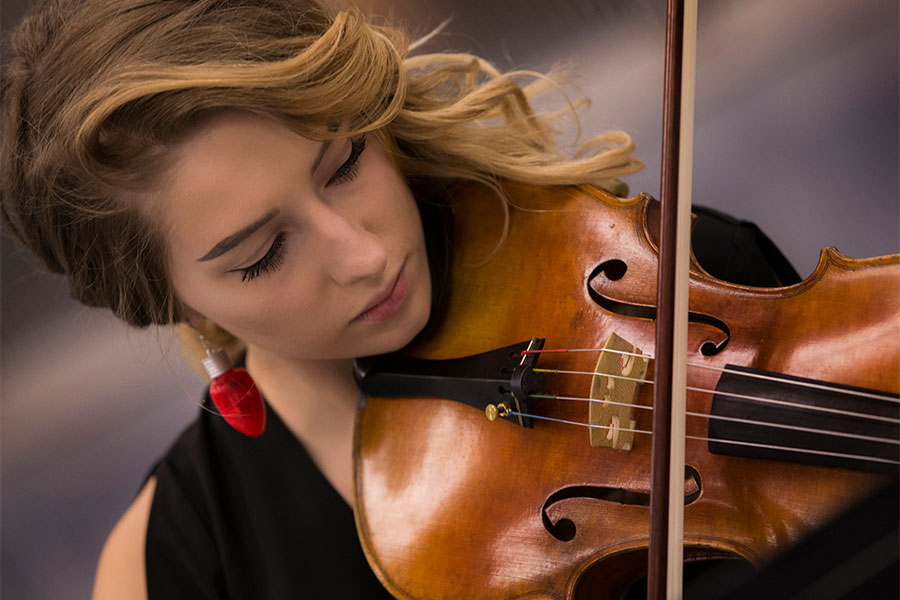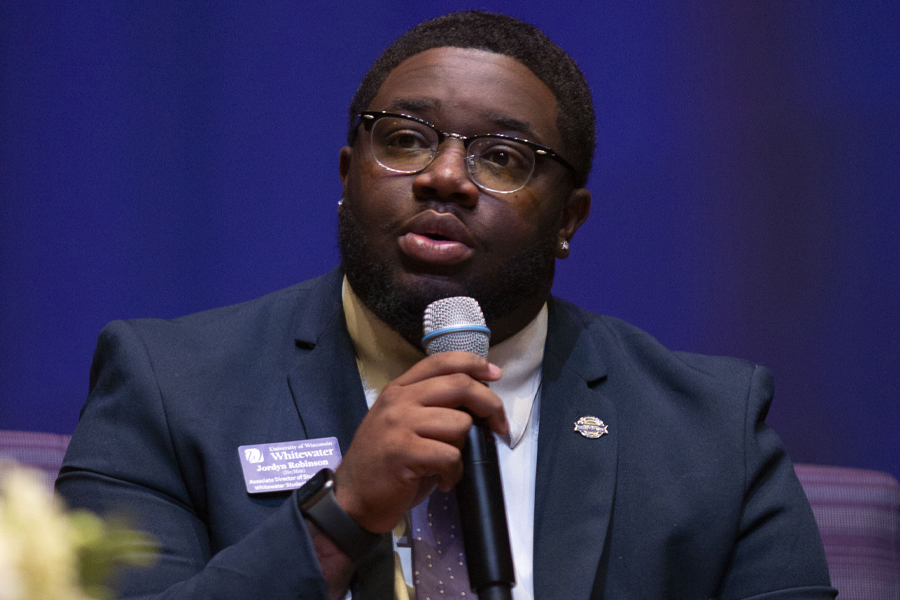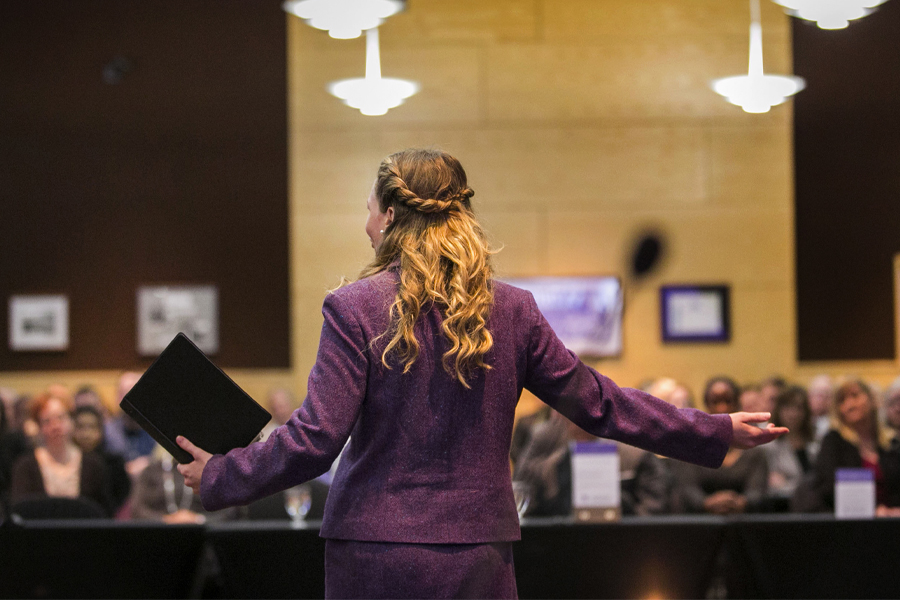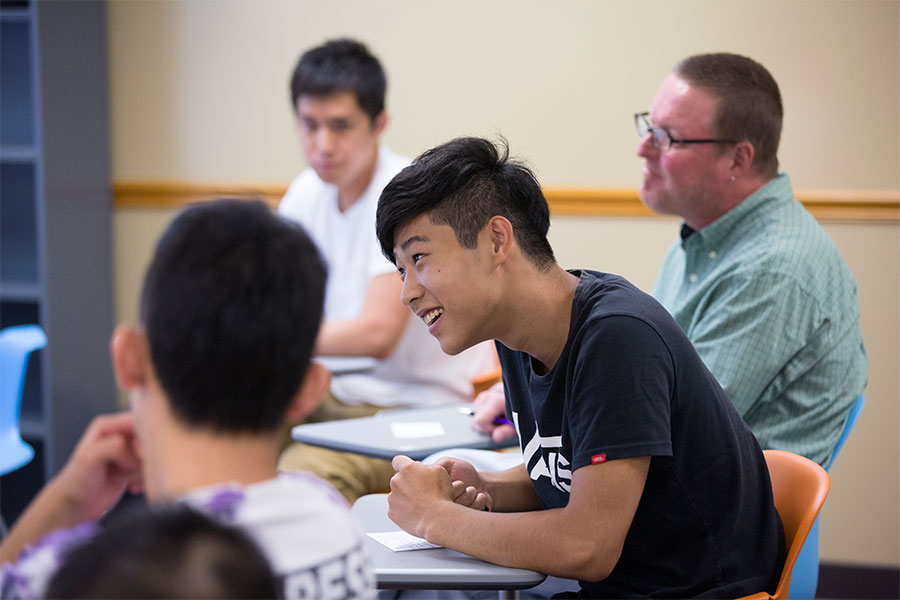THEATRE AND DANCE
Bachelor's Degree Programs
In the UW-Whitewater Theatre and Dance program, everyone has a chance to learn everything from the front of the house to behind the scenes. We’re a highly hands-on, collaborative program offering an array of major, minor and degree options.
Over the next decade, U.S. jobs in theatre and dance are expected to increase across the board, including an 8% increase for theatre and dance professors, 8% for producers and directors, 6% for dancers and choreographers, and 5% for set designers.
CAN WE BRAG A LITTLE?
Why study Theatre and Dance at UW-Whitewater?
At UW-Whitewater’s Theatre and Dance program, we’re:
- Large enough to offer a five-production season while being small enough to offer hands-on learning-by-doing experience.
- Inclusive: Anyone can declare a major or minor in our programs, and anyone can audition for a show.
- Active in the local community: for example, we offer matinee performances for area high school students and an annual Arts Immersion Day for area talented and gifted middle school students.
- Experienced: Our faculty members come from near and far, and many are well-situated in our regional theatre community.
We also offer about $40,000 of scholarships to Theatre majors and Dance minors each year.
Scholarship includes Incoming Freshman Scholarships [PDF].
What our Theatre and Dance students do
Theatre and Dance: Major areas

Whether you’re looking to major in theatre arts to pursue a career in a performance, education, production or a related area, you’ll be able to choose a path of study that fits your goals at UW-Whitewater. Here’s a brief overview of our degrees in theatre:
Theatre major: Get a broad education
Designed to give you a broad theatre education, the Bachelor of Arts option also allows you the flexibility to add a minor or even declare a second major.
BFA Theatre programs: Specialize your studies
Our BFAs are professional theatre programs that allow you to specialize in one of three areas:
- performance
- design/technology
- stage management
These programs are in-depth, interdisciplinary and highly customizable based on your interests. For example, the management and promotion program offers courses from marketing, communications and business; and the performance major includes electives from broadcast journalism, English and dance.
Theatre Education major: Teach future teachers
UW-Whitewater provides a broad-based theatre education program that prepares our future high school theatre educators, often with a minor in English.
Dance minor: Add some movement to your major
This liberal arts program will expose you to several areas of dance, including ballet, contemporary dance, dance composition, choreography and dance history/criticism. "“As an actor, I always recommend dance classes to colleagues. It provides a person with a strong sense of spacial awareness and a strong understanding of blocking for the stage. I rarely need to be told how to block scenes and I attribute that to my involvement in the dance program.” - Alumnus Tyler King
Learn more about our majors, minors and degree requirements, below.
Student involvement and practicum credit

With five productions each year, Theatre and Dance majors will have plenty of behind-the-scenes and performance opportunities. Our season line-ups might include:
- Musical theatre
- Plays
- Dance concerts
- Theatre for Young Audiences (TYA) performances
You’ll also have the chance to earn official course credit when you participate in various roles in student productions: acting, make-up, directing, sound, costuming, stagecraft, scenery, management/publicity, lighting and more.
Additional hands-on experiences
Regional festivals and beyond
We actively participate regionally in the Kennedy Center American College Theatre Festival and the American College Dance Association Festival. In fact, when we compete in dance competitions, other schools are always surprised to learn UW-Whitewater has “only” a minor.
On-campus employment
We offer work-study positions in our scene shop, our costume shop and our department office. This gives our students a chance to learn more about various aspects of theatre production and programming while working part-time and earning money.
Setting the scene: Our facilities
UW-Whitewater’s Theatre and Dance program uses a variety of learning, rehearsal and performance spaces; most are located in the Greenhill Center of the Arts, a place always bustling with music, theatre and dance majors. Here’s a look at a few spaces:
The Young: This 1,300-seat venue holds dozens of national and university events each year, from concerts and comedy to theater and dance.
Barnett Theatre: With a fully trapped stage — including an orchestra pit — this 380-seat theatre hosts many of our major productions.
Greenhill Center of the Arts: The largest academic building on campus and home to the departments of art, music and theatre/dance.

Hicklin Studio Theatre: Our versatile black box theatre can be reconfigured to fit a variety of productions, and it is also used as a classroom and rehearsal space.
Kachel Studio: This multipurpose space is home to tap and other dance classes.
Dance Studio: This 4,000-square-foot facility has a sprung Marley floor, warm-up spaces, locker rooms; and it is home to most of our dance classes.

Design Lab: Also a classroom space for our theatre tech students, the lab features drafting tables, a lighting lab and workstations with the latest production and design software.
Scene Shop:In this fully equipped woodshop , you’ll find a paint room, a tool room and a storage area with a large collection of props and furniture.

Costume Shop: The shop is home to an extensive costume collection plus all the tools you’d need to costume a show: sewing machines, sergers, cutting tables, a spray booth, and dye facilities.
What our graduates do
Dance and Theatre jobs: Career success
Our Theatre majors and Dance minors are well-rounded, well-prepared practitioners who find work across the country, from New York to California, in theatre, entertainment and education.
You’ll find our graduates in regional theatres, national touring companies, various Shakespeare festivals, dance studios and production companies — as well as teaching at schools and colleges. Here are just a few organizations:
- American Players Theatre (Spring Green)
- Milwaukee Repertory Theatre (or Milwaukee Rep)
- Asolo Repertory Theatre (Sarasota, Florida)
- Fireside Theatre (Fort Atkinson)
- Goodman Theatre (Chicago)
- Melk Music (New Berlin)
- Universal Studios (University City, California)
- Walt Disney World (Orlando , Florida)
- Kenosha Unified School District
Many Theatre majors and Dance minors also pursue MFA (Master of Fine Arts) programs after graduation.
Our Theatre and Dance faculty
Performers. Directors. Stage Designers. Choreographers. Our Theatre and Dance faculty is cast with an array of professionals, many of whom are still active in the non-academic theatre world.
Want to learn more about earning a Theatre and Dance degree?
262-472-1566 | thtrdnce@uww.edu | ![]()
![]()
In addition to UW-Whitewater’s general education requirements, Theatre and Dance students take a set of core courses and electives that will vary greatly depending upon major or emphasis. Select a program below to download the individual requirements.
UW-Whitewater offers the following degrees:
- Bachelor of Arts — Theatre | 4-year plan [PDF]
- Bachelor of Fine Arts (BFA) — Theatre, Design/Technology emphasis | 4-year plan [PDF]
- Bachelor of Fine Arts (BFA) — Theatre, Performance emphasis | 4-year plan [PDF]
- Bachelor of Fine Arts (BFA) — Theatre, Stage Management emphasis | 4-year plan [PDF]
- Bachelor of Science in Education — Theatre | 4-year plan [PDF]
Minors:
- Dance
- Musical Theatre
- Musical Theatre for Theatre Majors | 4-year plan [PDF]
- Musical Theatre for Music Majors | 4-year plan [PDF]
- Musical Theatre for non-Theatre/Music Majors | 4-year plan [PDF]
- Theatre
- Theatre Education | 4-year plan [PDF]
To apply, you’ll complete the UW-Whitewater application for admission and indicate your interest in theatre and dance.
View additional information regarding scholarship funds for Incoming Freshman [PDF] »
25/26 Productions
Eurydice by Sarah Ruhl
Directed by Robyn Accetta
Oct. 3 at 7:30 p.m.
Oct. 4 at 2 p.m.
Oct. 5 at 2 p.m.
Oct. 9 at 7:30 p.m.
Oct. 10 at 7:30 p.m.
Oct. 11 at 2 p.m.
Hicklin Studio Theatre
“Eurydice” by Sarah Ruhl, directed by Robyn Accetta, offers a hauntingly beautiful reimagining of the classic myth of Orpheus and Eurydice. In a realm where memory fades and language fractures, Eurydice’s journey becomes one of rediscovery—of self, of love, and of the past she left behind. With poetic depth and striking imagery, this production explores transformation, redemption, and the possibility of renewal, even in the shadows of loss.
“Eurydice” is presented by arrangement with Concord Theatricals on behalf of Samuel French, Inc.
Scrooge’s Christmas: A Christmas Carol by Charles Dickens adaptation by Ken Jones
Directed by Bruce Cohen
Nov. 14 at 7:30 p.m.
Nov. 15 at 2 p.m.
Nov. 16 at 2 p.m.
Nov. 20 at 7:30 p.m.
Nov. 21 at 7:30 p.m.
Nov. 22 at 2 p.m.
Barnett Theatre
"Scrooge’s Christmas: A Christmas Carol" directed by Bruce Cohen brings new life to Dickens’ classic tale in a fast-paced, heartfelt adaptation by Ken Jones. Ebenezer Scrooge is confronted by the ghosts of his past, present, and future, who lead him on a journey of redemption and transformation. You are sure to enjoy this fresh, theatrical spin on a timeless classic filled with humor, heart, and holiday spirit.
Produced by special arrangement with Heuer Publishing LLC of Cedar Rapids, Iowa.
The Prom
Book and Lyrics by Chad Beguelin
Book by Bob Martin, Music by Matthew Sklar
Directed by Robyn Accetta
Musical Director Robert Gehrenbeck
Feb. 20 at 7:30 p.m.
Feb. 21 at 2 p.m.
Feb. 22 at 2 p.m.
Feb. 25 at 7:30 p.m.
Feb. 26 at 7:30 p.m.
Feb. 27 at 7:30 p.m.
Feb. 28 at 2 p.m.
Barnett Theatre
Get ready for glitter, drama, and a whole lot of heart! "The Prom" directed by Robyn Accetta is a vibrant, feel-good musical that brings together an impactful story of queer love, Broadway glitz and small-town grit in a story bursting with humor, heart, and humanity. Full of show-stopping songs and powerful moments, this production celebrates redemption, transformation, and the joy of being seen. Whether you're here for the laughs, the love, or the glitter—there’s a place for you at "The Prom."
THE PROM is presented through special arrangement with and all authorized performance materials are supplied by Theatrical Rights Worldwide,1180 Avenue of the Americas, Suite 640, New York, NY 10036.
DanceScapes ‘26
Artistic Director: Amy Slater
March 14 at 2 p.m.
March 15 at 2 p.m.
March 18 at 7:30 p.m.
March 19 at 7:30 p.m.
Barnett Theatre
Get ready to be thrilled by "DanceScapes ’26." This production, under the artistic direction of Amy Slater, includes a variety of original dance pieces choreographed by students, faculty, and a special guest artist. You don’t want to miss this captivating performance!
The Liar by Pierre Corneille translated by Richard Wilbur
Directed by Bruce Cohen
April 24 at 7:30 p.m.
April 25 at 7:30 p.m.
April 26 at 2 p.m.
April 30 at 7:30 p.m.
May 1 at 7:30 p.m.
May 2 at 2 p.m.
Hicklin Studio Theatre
Wit and deception collide in "The Liar" by Pierre Corneille, brought to life through Richard Wilbur’s masterful translation and directed by Bruce Cohen. A charming trickster’s web of falsehoods spirals into chaos, setting the stage for unexpected truths and personal awakenings. Through sharp comedy and heartfelt twists, this classic tale explores the redemptive power of honesty and the possibility of transformation. Join us for a vibrant journey where every lie brings us closer to the truth.
Scene and Costume Shops
Jobs are available in our scene and costume shops for all students regardless of major. Contact our faculty for more information.
Ruth Conrad-Proulx
Technical Director
conradpr@uww.edu | 262-472-1561
Department Office
thtrdnce@uww.edu | 262-472-1566
Auditions
DanceScapes
All are welcome to audition for the annual DanceScapes Production with UW-Whitewater's Dance Minor Program. Take advantage of the opportunity to learn faculty, guest artist, and student choreography and perform professionally on the Barnett Stage.
WHEN:
- Friday, Sept. 12, 2-4 p.m.
- Monday, Sept. 15, 6:30-8:30 p.m.
WHERE:
- Greenhill Center of the Arts Dance Studio, YA 114
- Students only need to attend ONE audition date.
- No preparation needed for the audition; we will teach a warm-up and dance combinations.
- Please bring your schedule availability.
Unified Auditions: The Prom • The Liar • Scrooge’s Christmas
Saturday, Sept. 13
Barnett Theatre Auditions: 11 a.m.-12:30 p.m.
Music/Monologue Auditions in CA30: 12:30-2 p.m.
Monologue Only Auditions in CA30
Callbacks:
Sunday, Sept. 14
Dance Call: 11 a.m.-1 p.m. in Dance Studio/YA114
Show-Specific Callbacks: 1 p.m. - 2 p.m. in Barnett Theatre
About the Unified Audition
This single audition process will be used to cast:
- All roles in The Prom
- All roles in The Liar
- Three ensemble tracks in Scrooge’s Christmas:
- Actor 11 – Tiny Tim / Boy Scrooge
- Actor 12 – Belinda / Belle’s Daughter
- Actor 13 – Dick Wilkins / Belle’s Husband / Balladeer
No separate audition is required — all auditionees will be considered for all three productions unless you indicate otherwise.
All roles are cast without regard to conventional gender norms. Singing and movement are part of The Prom and Scrooge’s Christmas; ability to play an instrument is a plus for Scrooge’s Christmas.
Production Details & Character Breakdowns
The Prom
Book & Lyrics: Chad Beguelin | Book: Bob Martin | Music: Matthew Sklar
Directed by: Robyn Accetta
About the Show: Four eccentric Broadway stars are in desperate need of a new stage. So when they hear that trouble is brewing around a small-town prom, they know that it’s time to put a spotlight on the issue… and themselves. The town’s parents want to keep the high school dance on the straight and narrow—but when one student just wants to bring her girlfriend to prom, the entire town has a date with destiny. On a mission to make a difference, the Broadway stars team up with the courageous student, leading to a transformation that brings everyone together in the name of love and acceptance.
Character Breakdown
- EMMA NOLAN — Teenager in Indiana. A reluctant poster child for LGBT youth. Very smart. A bit of a tomboy quality.
- ALYSSA GREENE — A cheerleader and top student. Secretly Emma’s girlfriend. Faces constant pressure from her mother and friends.
- MR. HAWKINS — The straitlaced school principal. An ally to Emma and a long-time fan of Dee Dee.
- MRS. GREENE — Alyssa’s intimidating, conservative, but ultimately loving mother. The head of the PTA.
- SHELBY, KAYLEE, NICK, KEVIN — Other students at school who bully (but eventually learn to accept) Emma.
- BARRY GLICKMAN — Flamboyant Broadway star. Completely politically incorrect and doesn’t know it. Longs to give Emma the prom he was unable to have as a teen.
- DEE DEE ALLEN — Broadway diva. A huge ego to match her huge talent. Hilariously self-involved but yearns to do something good for someone other than herself.
- TRENT OLIVER — Pretentious Juilliard graduate recently cast in the non-Equity tour of Godspell. Loves to hear himself speak.
- ANGIE DICKINSON — An ensemble member in the Broadway production of Chicago. Jaded Fosse girl with a heart of gold.
- SHELDON — A charismatic press agent.
- Ensemble includes Olivia Keating, Opening Night Party Attendees, Reporters, High School Students, PTA Members, Motel Clerk, Cast of the Non-Equity Tour of Godspell, Monster Truck Rally Audience, Mrs. Greene’s Friend, LGBT Students
The Liar
Written by: Pierre Corneille | Translated by: Richard Wilbur
Directed by: Bruce Cohen
About the Show: A sparkling, rhymed-verse comedy of deception, romance, and razor-sharp wit. Dorante, a charming young man with a gift for invention — and an inability to tell the truth — spins elaborate lies that ensnare friends, lovers, and rivals in a whirlwind of mistaken identities and escalating chaos. This fast-paced, language-rich play is a feast for actors who relish verbal dexterity and physical comedy.
Character Breakdown:
- Dorante — Magnetic young liar, master of improvisation; agile with language and physical humor.
- Cliton — His honest valet, endearingly awkward, the audience’s touchstone.
- Clarice — Sharp, stylish young woman, quick-witted and confident.
- Lucrece — Reserved, intelligent friend of Clarice; unwitting target of mistaken identity.
- Philiste — Steady, rational suitor; a foil to Dorante’s chaos.
- Alcippe — Jealous, hot-headed rival; prone to dramatic outbursts.
- Geronte — Dorante’s flustered father; exasperated yet loving.
- Isabelle — Maid with sly humor; keen observer of the madness around her.
Scrooge’s Christmas: A Christmas Carol
Adapted by: Ken Jones from the novel by Charles Dickens
Directed by: Bruce Cohen
About the Show: A faithful yet brisk retelling of Dickens’ classic, blending warmth, humor, and music. This ensemble-driven adaptation uses doubling to bring Victorian London to life, with actors shifting between multiple roles. Music and movement are integral, creating a festive, heartfelt holiday experience.
Current Cast Highlights: Ian Hughes (Scrooge) • Core Miller (Bob Cratchit, Marley) • Caleb Jozwiak (Nephew, Christmas Yet to Come) • Thayer Coburn (Gentleman 1, Christmas Present) • Michael Miller (Gentleman 2, Fezziwig, Mr. Haversham) • Emma Cordray (Mrs. Cratchit) • Addie Fugelseth (Niece, Christmas Past) • John Venable (Young Scrooge, Joe, Thomas) • Savannah Konrad (Woman 1, Belle, Polly) • Sofia Guha (Woman 2, Mrs. Fezziwig, Mrs. Haversham) • David Froeber (Peter Cratchit, Boy-in-the-Street) • Bella Nuon (Fan, Martha Cratchit)
Vacant Roles to be Cast:
- Actor 11 — Tiny Tim / Boy Scrooge — Small but pivotal roles; warmth, innocence, and emotional presence required.
- Actor 12 — Belinda / Belle’s Daughter — Youthful energy; Belinda is playful and spirited, Belle’s Daughter is gentle and kind.
- Actor 13 — Dick Wilkins / Belle’s Husband / Balladeer — Versatile track; Dick is Young Scrooge’s jovial friend, Belle’s Husband is warm and gracious, Balladeer requires strong singing ability.
Additional Performances
Two touring performances (reduced version, midafternoon):
- Fairhaven — Target: Wednesday, Dec. 3
- Mulberry Glen — Target: Nov. 21, 24, or Dec. 5. Please confirm your availability for these dates.
Audition Requirements (applies to all three shows)
Saturday, September 13 — Initial Auditions
Present either:
- Two contrasting monologues (≤3 minutes total) OR
- One monologue and 16–32 bars of a song
- If singing:
- Marked sheet music preferred (accompanist provided)
- Backing track allowed (bring your own playback device)
- Musical auditions will be scheduled in a block for efficient pianist use
Sunday, September 14 — Callbacks
- Morning: Dance call (The Prom — will consist of a minute or less of choreography done to one of the songs from the show), 11 a.m. - 1 p.m. in Dance Studio
- Afternoon: Show-specific callbacks, 1 p.m. - 2 p.m. in Barnett Theatre
Sign-Up
Reserve your audition slot. Upload a resume and headshot (clear shoulders-up photo acceptable). Arrive 5 minutes early. Walk-ups accepted as time allows.
Questions?
The Prom: Robyn Accetta — accettar@uww.edu
The Liar or Scrooge’s Christmas: Bruce Cohen — cohenb@uww.edu
Scripts: Available in the Theatre/Dance Department office

